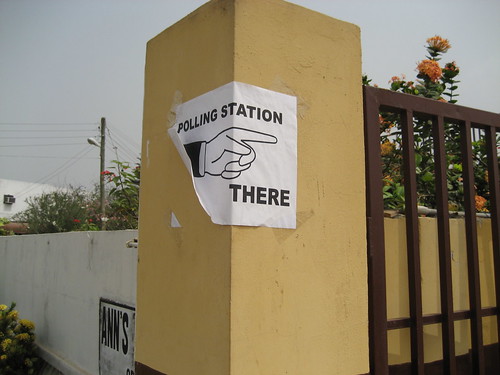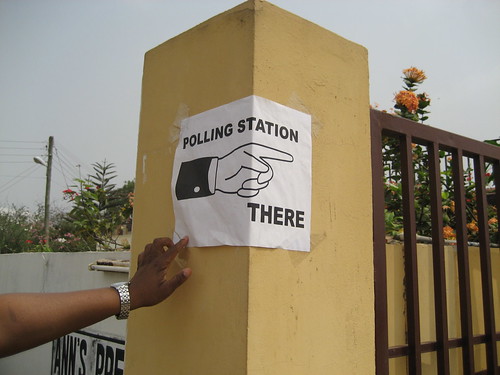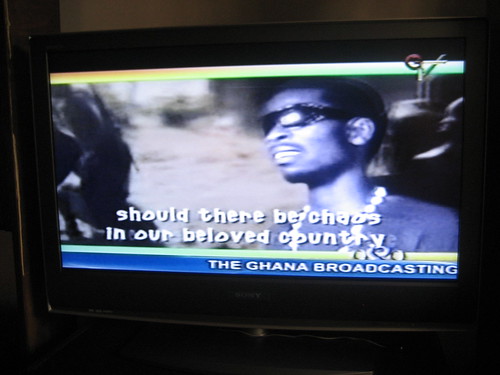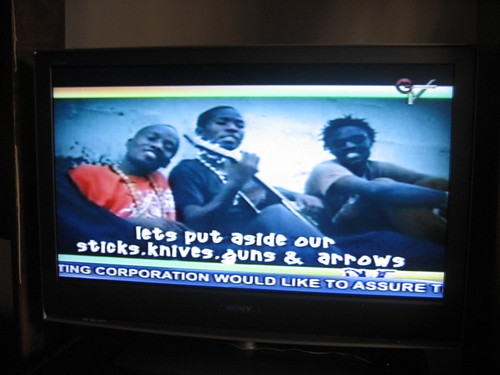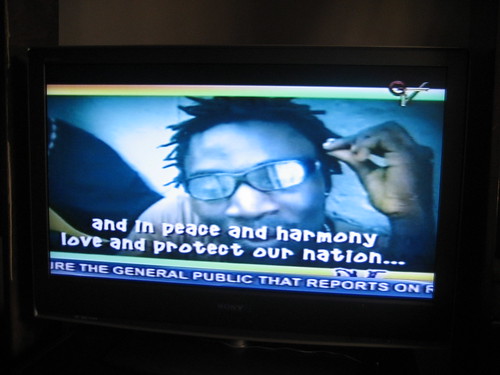Thursday, December 23, 2010
The Côte d’Ivoire Issue
Abidjan skyline.

Today I want to write something about Côte d’Ivoire. Why is this relevant on an Afro-European blog? Because the current situation in Côte d’Ivoire is about conflicting interest between Africa and Europe. Because the Ivoirian community of France is clearly expressing its frustration in the way France (and generally the West) is involved in local issues in Africa (see video's below). In this post I will try to clarify what is exactly going on as I think this story is relevant for most ex-colonies in relation to their past and Europe, this story is relevant for all Europeans of ex-colonial origin.
Rich but poor
Côte d’Ivoire is on the brink of a civil war. Again. People disappear, others are threatened. Côte d’Ivoire has long been considered an example of how it should be. But while being the greatest cocoa exporter in the world, while being a economically prosper country, Côte d’Ivoire still has its majority population living in utter poverty. Many countries in Africa have the poorest populations in the world while they often are very rich countries. The reason for this is complex. There is the colonial heritage, there are Western financial interests, there are disloyal and corrupt leaders, demographic explosion, … Côte d’Ivoire is today another victim of all these elements. Big boys with different interests are using the African people to gain their advantage, whether black or white, Ivoirian or French.
Côte d’Ivoire has long been a prosperous country. It is the world’s lead cocoa exporter and Africa’s biggest palm oil producer (palm oil is an important raw material in the manufacture of soaps, washing powder and other hygiene and personal care products, besides biodiesel).Even before independence Côte d’Ivoire was economically the most important region of French West Africa (which was administered as one colonial entity, only divided by France during the independence struggle). Many people from all over French West Africa migrated there for work. After independence this trend didn’t stop. These migrations have been going on for decades now, and many people who are born and raised in Côte d’Ivoire have foreign roots in other formerly French West African countries. Many live in the north and urban areas, with a concentration in the economical center of the country: Abidjan (the capital being Yamoussoukro).
Not only Africans moved to Côte d’Ivoire for work. In contrast to many African nations, the presence of French people more than doubled after independence while many other Europeans also came to work in Côte d’Ivoire. Today the white elite is fleeing the country.
Côte d’Ivoire is not just another African republic. Western nations, France first, have many financial and economical interests there. This is why they are getting involved so much. Below I will go deeper into Côte d’Ivoire’s history and the meaning of last elections for the international community.
Félix Houphouët-Boigny
Félix Houphouët-Boigny was Côte d’Ivoire’s first president and he stayed in power until his death in 1993. Although having spend large amounts of public money for megalomaniac projects, he was and still is a very much respected and loved figure for the Ivoirian people. Félix Houphouët-Boigny has been instrumental in keeping the Ivoirian nation united, avoiding ethnic tensions and accepting Ivoirians of foreign origin as fellow nationals and Ivoirians.Félix Houphouët-Boigny is a giant of the African emancipation. He is a name stated next to Senghor and Césaire. He left a stable and relatively prosper country behind him. Things would start to change dramatically after that.
Ivoirité
Bédié followed him up. He succeeded to divide his rivals and held on to power. To do that he emphasized the concept of ‘Ivoirité’, or Ivoirian identity, excluding his main political rival Allassane Ouattara, Houphouët-Boigny’s last prime minister. Although Ouattara was born in Côte d’Ivoire from parents who were also born in Côte d’Ivoire, he has roots from Burkina Faso, which made him in Bédié’s concept of Ivoirité a foreigner.
This excluded Ouattara from presenting himself for the presidential elections of 2000, but also excluded a great many people in Côte d’Ivoire from the Ivoirian nationality. Consequently the relationship between various ethnic groups became strained and a fire was sparked which is still burning today.
Bédié also tried to exclude potential opponents from the army. This led to a military coup in 1999 and the organization of new elections in 2000. That’s when Gbagbo got elected. Still, the concept of Ivoirité persisted in post-Bédié Côte d’Ivoire. Excluding Ouattara from the 2000 presidential election led to the civil unrest during the elections and eventually to a civil war in 2002.
Rebellion in 2002
The rebels controlled much of northern Côte d’Ivoire, where many Ivoirians lived who were excluded from Ivoirian nationality due to the Ivoirité policy. The rebels threatened to seize Abidjan, the economical center, but then France came into the picture. Under the official stance that French soldiers were sent to protect French citizens living there, many consider they were there to protect their financial and economical position. For many Ivoirians today the French actions worsened the situation in the long term. France didn’t learn from what happened then.
Alassane Ouattara took refuge in the French embassy, his home in Abidjan burned down. President Gbagbo stated, in a television address, that some of the rebels were hiding in the shanty towns of Abidjan where ‘foreign migrant workers’ lived. The police forces bulldozed and burned homes by the thousands, attacking the residents.
Transition under Gbagbo
Eventually a few months later in 2003, Gbagbo and some rebel leaders signed accords creating a government of national unity. But that government prooved unstable. UN peacekeepers and French troops still controlled areas of the country and violent clashes occurred often. When the time for presidential elections came in 2005, it was deemed impossible to hold an election due to the lack of disarmament.The 2005 elections were postponed until last month, november 2010. This time Ouattara was not excluded because of his so called Burkinabe origins.
The preliminary results announced by the Electoral Commission showed a loss for Gbagbo in favour of Alassane Ouattara who won with 54% of the vote (having received most votes from the Northern departments and the city of Abidjan). Gbagbo’s ruling FPI contested the results before the Constitutional Council, charging massive fraud in the northern departments. These charges were contradicted by international observers.
The Constitutional Council, which consists of Gbagbo supporters, declared the results of seven northern departments unlawful and that Gbagbo had won the elections with 51% of the vote. After the inauguration of Gbagbo, Ouattara, recognized as the winner by most countries and the United Nations, organized an alternative inauguration. These events raised fears of a resurgence of the civil war.
When I heard this news I was tempted to compare Gbagbo’s succes with the re-election of George W. Bush. But I couldn’t remember any official foreign reaction or support for Al Gore at the time.
I am not a Gbagbo fan. Since he came to power he has always used the ethnic card to gain popularity. Besides that he has questioned the French presence and economical interests in his sovereign country. This has led to ethnic tensions and to a worsening of the economical situation.
The first who suffer are the poorest, not the political elite. But Gbagbo blames the ‘foreign immigrants’ and the French. Ouattara represents both at the same time. Considering the election’s official results (51% for Gbagbo) I would think that Gbagbo’s discourse is not that convincing for the Ivoirian masses. Still, considering all this I wonder if it is a good idea to try to oust him from power right now. Certainly, I don’t think that it is the West’s role to do so. Sadam Hussein may have been a ruthless dictator, ousting him from power hasn’t improved the lifes of Iraqi’s. More on the contrary.
Ouattara
Ouattara is considered by Gbagbo as a representative of foreign and Western interests. And he actually is. Ouattara was educated in the US and earned a PhD in economics from the University of Pennsylvania. He worked for the IMF and the BCEAO (central bank for the east African states) in Paris which makes him an advocate of the Franc CFA.The Franc CFA is the common currency of most former French colonies. It is pegged to the Euro and according to many critics the cause of many economical problems and the economic dependency of these African states towards Europe. The Franc CFA is controlled and managed from Paris. Ouattara worked for the BCEAO in Paris until becoming its governor in 1988.
During the last years of Houphouët-Boigny’s rule from 1990, he was Côte d’Ivoire’s prime minister and actual leader once Félix Houphouët-Boigny got too ill. Ouattara was the one who announced Félix Houphouët-Boigny’s death to the nation.
After a brief power struggle bewteen Bédié en Outtara, Bédié became president en Ouattara resigned as prime minster. He went back working for the IMF as Deputy Managing Director and stayed there until 1999. After that he re-entered the political arena in Côte d’Ivoire leading up to the elections of last month.
Because of his career and marriage to a French woman (Dominique he often is considered by his critics as a representative of French and Western interests, and considered due to his northern roots and white wife, as not a real Ivoirian.
All these are false arguments of course. While understanding the critique against Western economical interests in Africa I don’t think that confrontation is the best tactic to improve the live of the Africans. It might get you elected, but then?
French Ivoirians and the Ivorian issue
Ivoirians in Paris supporting Gbagbo and protesting against French involvement (nr1):
One of the interviewees says: “Gbagbo is contested because he annoys the Western world, because he wants the wealth of Africa to be for the Africans … He is the man who can raise up Africa.”
Ivoirians in Paris supporting Gbagbo and protesting against French involvement (nr2):
Ivoirians in Paris protesting against Gbagbo in favor of Outtara(nr1):
Ivoirians in Paris protesting against Gbagbo in favor of Outtara(nr2):
Considering the reactions of Ivoirians in France it is clear that even if Gbagbo stole the elections it is not the role of foreign nations to intervene in local matters. According to Ivoirians this can only worsen the situation and divide the nation even more. The Ivoirians have to solve their own problems.
As you can see in the video’s above the Ivoirians are divided, but they areready to talk. Most voices of whatever side are against war and violence and have a peaceful message.
According to me Ouattara should accept his unfair defeat and go into opposition. From there he should teach Gbagbo what is democracy and from there he can either trap him (blame Gbagbo for all problems or show that he doesn’t do what he says) and make himself popular to an even larger electorate.
Gbagbo plays the role of the ‘real African’, fighting against the Western interests and therefore ‘for the African people’. But at the same time he is throwing oil on the ethnic fire that is burning since Bédié’s presidency. Côte d’Ivoire is devided between North and South, between Muslim and Christian, between ‘foreigner’ and ‘autochtones’. But it is a false division that is hiding the deeper laying problems of a rich country with too many poor people, of a rich country where foreigners, big companies and corrupt politician are getting richer, while the masses are living in dire poverty. It sometimes seems to me that Gbagbo is copying French political style, where Frenchness is questioned (refering to Sarlozy’s ‘débat sur l’identité française’) next to the so called ‘immigrant Muslims’.
Today the country has been sealed off from the outside world by Gbagbo. Gbagbo is not considered a lawfull head of state by the UN, EU and US. They only recognize Ouattara as the lawfull president. But a president without power, and the West’s reactions is only worsening the local situation. Everybody is holding their breath.
Guinea
All this happens today in so exemplary Côte d’Ivoire while Guinea-Conakry, the bad boy of former French colonies (who rejected the Franc CFA and has its own currency), a country with difficult diplomatic relations with France, just had its first free and fair elections since independence (without France or the UN getting involved). The transition from dictatorship to military rule and then elections didn’t happen without problems of course. But it was a transition done by and for the Africans themselves. Let’s now wait and see what freshly elected president Alpha Condé will do for his country and its people.
Thursday, December 23, 2010
Electoral Fictions
Shamelessness is an essential component of the how to hand over to yourself blueprint but, as our Ivorian brethren are currently demonstrating, there is still room for innovation within that framework, and depths of crassness that can yet be plumbed. We live in a world of politics as theater and where elections are the ultimate in stage-managed human drama. Suspension of disbelief is essential in any fiction, and disingenuousness mandatory in electoral fictions.
I write this of course after watching events in Côte D'Ivoire over the past few weeks. The initial emotion was bemusement and indeed laughter - how can one not laugh at the spectacle of someone literally tearing up election results to prevent them from being declared. Still the inept antics only brought back the automatic, unrequited cringe I've had at Ivorian politics for the past decade. I remembered of course that I'd even awarded Laurent Gbagbo, his wife and their death squads an award of sorts, and looking over their 2004-5 citation, all the elements were there: the needless waste of everyone's time, the hubris, the threats and the violence. Still I have been holding my breath, a neighbour's house is still on fire.Of course we've long since moved beyond laughter to the realm of tears. It's the usual litany, the West African yearning for normalcy: why should the conduct of elections make fraught headlines? Why seal borders? And those death squads and the obligatory evacuation of foreign nationals? And so forth, it's a depressing lament. Most Ghanaians are gearing up to receive the refugees who have already started leaving the place. Sidenote: if refugees are leaving Côte D'Ivoire to go to Guinea and even Liberia, a country recovering from 14 years of civil war, how many more can we expect in ostensibly stable and oil-producing Ghana? Incidentally, we were on notice as to how ugly things might turn out. Recall if you will, the September story about that Ivorian man arrested in California attempting to buy arms to smuggle in contravention of the UN embargo. The salient quote:"$1.9 million wired to the US as a 50 percent downpayment on the weapons... the shipment of 4,000 handguns, 200,000 rounds of ammunition and 50,000 tear gas grenades to Ivory Coast."As you watch the distressing news footage, imagine the additional damage this consignment would have wrought in light of the violence, reports of militias, mercenaries and nighttime disappearances. The fact also that millions of dollars were so readily transferred surely indicates the importance the old government placed on the military option and indeed the planning that was involved (the International Criminal Court should take note). But anyway all that is a matter of ruthlessness, let's deal with lighter topics: shamelessness, political theater and electoral fictions.We have seen problematic elections in this season - consider Burma as the archetype, or might you prefer the thuggish Egyptian variant held on the same day, or perhaps even the Belorussian just this past weekend. It is striking Ivory Coast takes the cake even in such abject company. The usual saying goes that "It's not who votes that counts but it's who counts the votes"; we are witnessing new clauses being added to that formulation. Call the Ivorian innovation on this front the Gbagbo Imbroglio, if you will. Their singular contribution to the body of electoral fictions is nothing less than the fictitious election. The usual practice when handing over to oneself is to hold back declaring results in your strongholds and wait until you know how many votes you need. In Chicago or Kansas City in the past, this was a matter of figuring out how many cemeteries to mine for the requisite names. In Ghana in the 90s, results from the Volta region always came in suspiciously late, later even than the Northern regions, and 98 percent votes in favour of the incumbent and 100 percent turnout (or more) would be the norm - shades of Mobutu or perhaps referendums in Stalin's time.Gbagbo and company couldn't manage to do this, indeed the electoral commission that this sitting government had put in place took its job seriously and was remarkably independent - as well it should since a tremendous amount of effort had been put in place by Ivorians and the international community to stage these elections. The resort, then, was to say that the electoral commission did not have the right to declare the results. Which brings me again to that video clip I noted earlier that I've been stewing over (and hopefully the BBC won't mind my using their image, I recommend to everyone their closing line: "the elections have been canceled six times in the past five years."). I haven't seen a more perfect piece of political theater in years. Every actor played their part brilliantly. When the next day, the head of the electoral commission did manage to sneak out and declare the results, the Gbagbo camp would remark that the declaration was invalid since it hadn't been made within the requisite timeframe. In other words, the declaration that could have been made the prior night had turned into Cinderella's carriage once midnight had passed. What then followed would clearly demonstrate that Ivory Coast has had a fictitious election.It would only be after the election results were declared that a 'Constitutional Council' would throw out the votes of 12 percent of the country so that the "results" would be in Gbagbo's favour. Surely this must be the most innovative response to an electoral contest. I can't imagine a greater slap in the face short of actual physical slaps in the face - and these have since been forthcoming.First for 15 years ago, you say that a large part of your countrymen are not Ivorians, then you say that they are but that they can't register, then you delay for 5 years, then you allow only some to register as you then delay registration and again delay the vote. Then the whole country votes votes and even your folks vote against you so that the opposition win. And now you go and nullify their votes even though most of the irregularities were in your strongholds. Words fail me.When Laurent Gbagbo would wrap himself in the flag and declare himself president, it would only bring to mind coronations of yore. The question at the outset was whether Gbagbo's generals would follow the Burma blueprint and make his opponent, Outtara, an Aung San Suu Kyi of sorts. Burma of course outdoored its own electoral fictions recently - said elections were timed to occur while the Nobel laureate was under house arrest serving her expediently conferred and lengthy sentence. Just to make sure of the outcome, her party was essentially banned in any case.Earlier on, one wondered if it would it be the Algerian Algorithm of simply don't hold the second round since you know how it would go.There was also the option of Abacha Abrogation - with Nigerian bluntness, simply call things off.The Baker barrage - I'm referring to the slickness of the Bush-Gore 2000 business where James Baker was consigliere: run the clock down. Recall that group of Republican lawyer types that stormed counting in Florida. Then the Supreme twist - a legal opinion that should not be construed as a precedent, mutterings about irreparable harm notwithstanding.A close counterpart is the Mugabe Mutation, a variant of the rope a dope: lose in the first round of elections and resort to the 'or else'.Finally I suppose there is the Lukashenko option
Perhaps six out of nine Belarusian presidential candidates were in jail. One of them, Uladzimir Neklyayev, was beaten unconscious and then dragged away from the hospital wrapped in blankets.
Laurent Gbagbo has already served an extra term as President - five whole years beyond the end of his mandate. We have been on notice as to his willfulness and are watching in almost despair as he does his worst, hoping against hope. I have a pet theory that someone who has been a political prisoner will do exactly what he wants to do (pace Mugabe, and Mandela notwithstanding). The irony is that Gbagbo was on the receiving end of a famously rigged election. When I wrote my 1993 piece, I was in awe of the slick manner in which Houphouët-Boigny had used his considerable powers of incumbency and dealt with his opposition in 1990.Given all the precedents one had expected a certain finesse or perhaps panache in the electoral strategy. As a Wikileaked cable from the US embassy in Abidjan put it in July 2009, "There will not be an election unless President Gbagbo is confident that he will win it -- and he is not yet confident of the outcome." As well he should have been. The cable also noted that it was unlikely the elections would be held in early 2010 as expected since Gbagbo would undoubtedly want to preside over the jubilee ceremonies of 50 years of independence. "The prestige and celebrity that goes with hosting such an historic event" was insufficient as we have seen. All of that came to pass. This was a long game and Laurent Gbagbo has never missed an opportunity to disappoint. The exasperating and novelistic playbook has been followed to a fault. Delay, suborn, browbeat, bludgeon, deny, wrap yourself in the flag, bluster, and, if need, be suppress and kill - those death squads.We tell ourselves stories about elections, but it isn't often that the reality surpasses the myth. It has been a colossal waste of everyone's time. We have gone from electoral fictions to fictitious elections. File under: rogues, Ivory Coast, Côte D'Ivoire, strategy, politics, elections, fraud,culture, observation, Africa, toli



